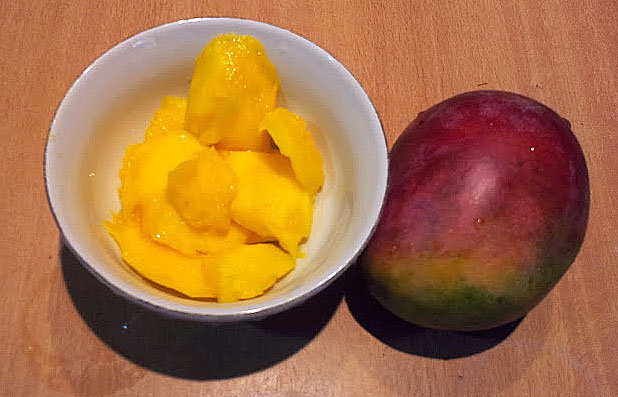Mango -Exotic fruit, its benefits and harms
Ripe mango sweet or slightly sour, can sometimes resemble peach should smell, especially felt in the area of the stalk, resinous smell, little bit remind smell of fir-needle…
Homeland of mango is India. The Indians called it “the king of fruits.” and also “Asian apple.”
Buddha himself liked to relax in the gardens of mango, narrating the traditions of Hinduism.
Mango pulp consists of water, includes proteins, carbohydrates and fat, rich in essential vitamins D, C, A, group B, contains calcium, phosphorus, iron, zinc, manganese, potassium, pectin, organic acids, sucrose, oleoresin, mangosteen which is extracted from the kernel of mango and a good antipyretic.
Vitamin A ,that contained in the ripe fruit in large quantities, has beneficial effects on the organs of vision: helps with “night blindness” dryness of the cornea and other eye diseases. In addition, regular use of ripe fruits in food improves immunity and protects against infection. Content of vitamin C can reach up to 175mg per 100g of fruit pulp. Besides, there are a high content of sugars such as sucrose, xylose, glucose, fructose, sedoheptulose, maltose, mannoheptulose.
It is recommend chew for two weeks slowly small pieces of mango to strengthen the heart muscle. The main thing – to keep the fruit longer in the mouth. Mango leaves used as decoctions to improve vision in diabetes, as well as for the treatment of diabetes itself. This broth is administered to enhance the cardiovascular system and the treatment of pancreatic cancer. If you have varicose veins, multiple hemorrhages on the skin – is also worth a try to drink a decoction of mango leaves .
Mango Diet :
Without harm to health can reduce weight with the help of the mango–milk diet, which is considered to be very balanced. The fact is that mango is an excellent source of sugar, but it does not have proteins at all. In milk that is rich of proteins is not so much sugars. Therefore, the combination of mango and milk gives full power to the symbiosis products.
The harm of mango:
Overeating ripe fruit can lead to allergic reactions, intestinal disorders, constipation.
Caloric: 65 kcal.
Protein: 0.51 g.
Fat: 0.27 g.
Uglevody15, 2 c.
Dietary fiber : 1.8 g.
Ash 0.5 g.
Water 81.71 g.
Mono-and disaccharides, 14.8 g.
Saturated fatty acid 0.066 g.
Calcium 10 mg.
Magnesium 9 mg.
2 mg sodium.
Potassium 156 mg.
Phosphorus 11 mg.
American scientists who have studied the beneficial properties of mango, an experiment was conducted in which it was revealed that this fruit helps to normalize blood sugar levels. Whereby the mango can be used full-bodied people and diabetics.







